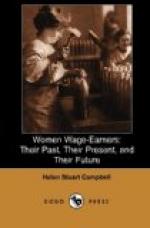The census for 1851 gave for Paris 112,891 workwomen, 60,000 of whom were sewers. Convent sewing, that of the prisons and reformatories, and the competition of women who had homes and worked simply for pin-money, kept the wage at a minimum; and these conditions still operate toward that end, precisely as they do for all countries where the needle is a means of support, the evil being felt most severely in our cities. The facts in the life of a French seamstress are much the same as those of the Englishwoman. To earn two francs a day she must make eight chemises, working from fourteen to sixteen hours daily to accomplish this. The income of the average sewer does not exceed, at the best, five hundred francs, and most usually falls below. Rents are so high that a garret requires not less than one hundred francs a year. In his researches into conditions, Jules Simon[32] found that this sum compelled deprivations of every order. Expenses were as follows: Rent, 100 francs; clothing, bedding, etc., 115 francs; washing, 36 francs; heat and light, 36 francs. These sums amounted to 286.50 francs, the amount remaining for food being 215.50 or a little less than twelve sous a day,—the amount expended by two of our own seamstresses in New York in 1887, the items being given by the earner.[33]
Existence on French soil, whether in Paris, the manufacturing towns, or the provinces, has come to mean something very different from the facts of a generation ago. Then, with wages hardly above “subsistence point,” the thrifty Frenchwoman not only lived, but managed to put by a trifle each month. Wages have risen, but prices have at the same time advanced. Every article of daily need is at the highest point,—sugar, which the London workwoman buys at a penny a pound, being twelve cents a pound in Paris; and flour, milk, eggs, equally high. Fuel is so dear that shivering is the law for all save the wealthy; and rents are no less dear, with no “improved dwellings” system to give the most for the scant sum at disposal. Bread and coffee, chiefly chiccory, make one meal; bread alone is the staple of the others, with a bit of meat for Sunday. Hours are frightfully long, the disabilities of the French needleworker being in many points the same as those of her English sister. In short, even skilled labor has many disabilities, the saving fact being that unskilled is in far less proportion than across the Channel, the present system of education including many forms of industrial training.
Generations of freer life than that of England, and many traditions in her favor give certain advantages to the woman born on French soil. It is taken for granted that she will after marriage share her husband’s work or continue her own, and her keen intelligence is relied upon to a degree unknown to other nations. Repeated wars, and the enrolment of all her men for fixed periods of service, have developed the capacity of women in business directions,




